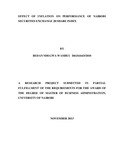| dc.description.abstract | Inflation in Kenya has been unstable especially during the period of study. Increased
inflation is associated with high cost of living thereby reducing amount available for
investment. The government aims to maintain a constant rate of inflation characterized by
a single digit. The aim has been to make inflation almost predictable and not sporadic as
it has been in the Kenyan economy. Consumer Price Index (CPl) is used in measurement
of inflation in Kenya. It is of concern to establish the effect inflation risk has on the
shares market. The study had the objective of establishing the effect of inflation risk on
the performance of the NSE 20 share index. The study used the NSE 20 share index to
represent the performance of share market in Kenya. The index is the oldest and widely
used share market performance indicator in Kenya. The study considered theories dealing
with macroeconomic indicators including inflation. The study considered various theories
on share prices including Portfolio Selection Theory, Capital Assets Pricing Model
(CAPM) and Arbitrage Pricing Theory (APT) and evaluated empirical evidence from
studies conducted in Kenya and around the world. The study also reviewed behavioural
theories on investment including prospect theory and heuristic driven biases. The study
used secondary data which was analysed through statistical tests. Monthly inflation data
was obtained from Kenya National Bureau of Statistics (KNBS) while the monthly value
of NSE 20 share index was obtained from Nairobi Securities Exchange (NSE). The aim
was to establish a predictor model having the NSE 20 share index as the dependent
variable and inflation as the independent variable. Analysis of the variables used the
SPSS program to conduct tests on the data. Scatter diagram, descriptive statistics and
simple regression models were used in the analysis. The best fit line on the scatter
diagram indicated there is no relationship between the 2 variables. Descriptive statistics
indicated that both variables are widely distributed with Inflation having a mean of 8.86
and standard deviation of 5.26 while NSE 20 share index has a mean of 3,534.04 and
standard deviation of 1,204.9.The value of R squared is 0 meaning there is no
relationship between the variables. The regression model developed is weak in predicting
the NSE 20 share index value. The study recommends controlling of inflation rate to
make it more predictable and create a favourable investment environment. The study
further recommends investigation of the effect of inflation | en_US |

